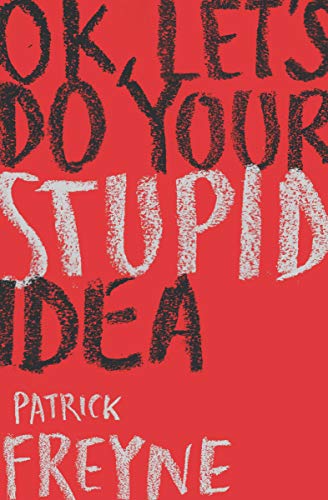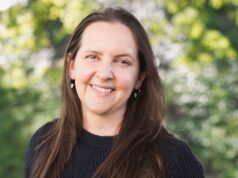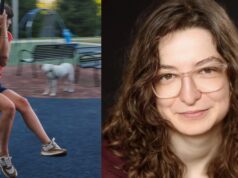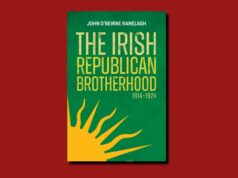Embracing confessional memoir and turning blood into ink.
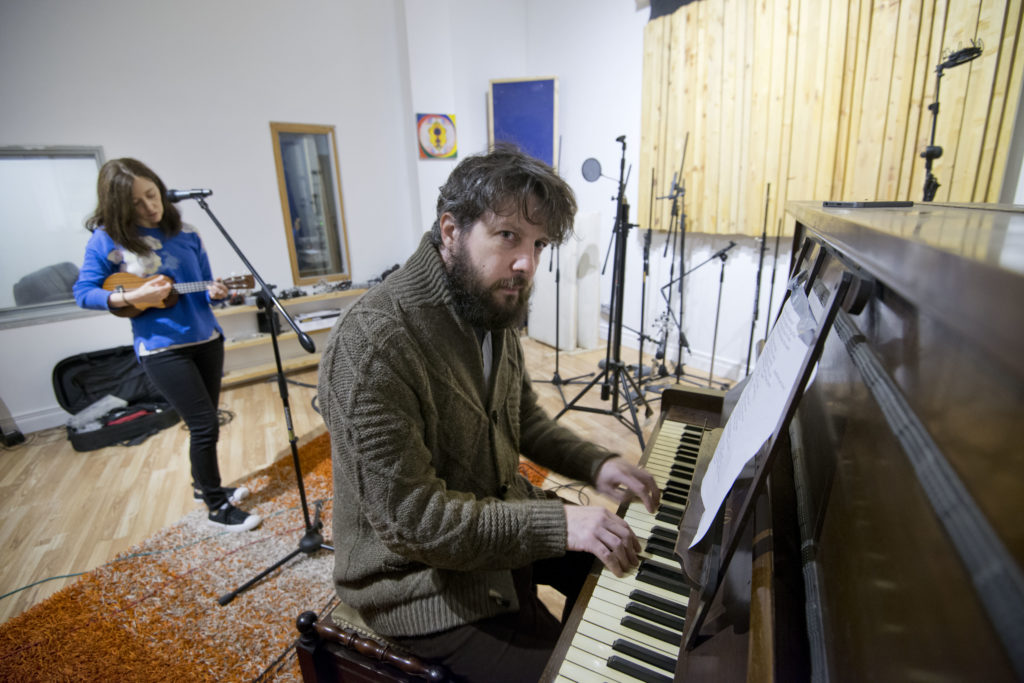
Patrick Freyne talks to Mary McCarthy
If novels involve making things up in order to tell the truth about life, then memoir brings us closer to the fire. While fiction can help us look at things in a different way, structured plots often fail to nail floating existential anxiety like the personal essay can. Readers increasingly want life experience straight from the horse’s mouth, and perhaps this explains why sales of the personal-essay genre are so robust right now.
Irish writers have made a welcome contribution to this trend with Emilie Pine’s Notes to Self and Sinead Gleeson’s Constellations, among others, and it is into this receptive market that Irish writer and journalist Patrick Freyne will release his collection of essays OK, Let’s Do Your Stupid Idea (Penguin Ireland) this May.
Freyne has that ability to line up the right words, in the right order, to create a kind of magic. His reviews and features for The Irish Times have a knack of zoning in on the non-obvious, yet suddenly essential, slant. He rarely fails to give a sympathetic insight into the motivations of his subjects, and his writing has a zaniness with often hilarious effects—the recent Dermot Bannon pieces are a prime example. Even when writing in a completely fantastical realm—such as flirting with Mr Tayto propped on a bar stool beside him—he immerses his readers easily. So, to a certain extent, he already has a market; his current fans, who are already familiar with his abilities, will no doubt want to learn more about him.
Patrick took three months’ unpaid leave early last year to write fiction. Instead, what happened was the core of this collection, though his fiction is still on the boil. I caught up with him for a coffee to get the inside track on his book and to ask him about his writing process.
Like Gleeson and Pine, and he counts both as friends, Patrick does not shy away from life’s big issues—he writes about coming to terms with not having children (and how refreshing to get a man’s slant on this) and about his own mental health challenges—something that will interest the many who may be suffering but don’t get help. Lighter topics include his days in a band and stretches spent living in Germany in his twenties. An essay on journalism promises to be interesting.
T.S. Eliot said ‘the purpose of literature is to turn blood into ink’ and right now confessional memoirs seem best placed to do this. Judging from the quality of the essays we have already seen from him, it is hard not to forecast that Patrick Freyne, already well known in Ireland from the day job, is about to get some serious worldwide attention.
Can journalism teach you to write?
Journalism has taught me how to write clearly and quickly, to be aware of what is going on and to select what readers want to read about. With my columns I’m always looking to start with an angle that’s not immediately obvious. Often, the hook is a metaphor that merges with a joke. I start with that but don’t write in order at first. I just fill the page with disjointed observations and attempts to describe what’s happening on the screen … Then, when I’ve enough stuff, I slowly pull it into a coherent narrative. When I was writing about Dermot Bannon, a Fight Club metaphor seemed obvious to me because he’s a man at war with himself, so that’s the first bit I wrote. I actually love ‘Room to Improve’. Dermot Bannon is so emotional. He cares so much. It’s Shakespearean.
I’ve always found life pretty absurd, especially power—the privilege of those who have it and how they use it. My essay collection has ended up being funny in places (at least I hope it has) but I also ended up writing about more serious things—carework, bereavement, mental health. Years ago, I thought I’d end up writing a book of humour—something like Clive James or David Sedaris—and I didn’t expect to also be writing about more serious things. Emilie Pine and Sinead Gleeson are friends of mine and they’ve clearly been an inspiration for me.
Did you plan to go into journalism?
I studied English at Trinity and then did a short journalism course in DIT, though straight-up news never appealed to me. I preferred feature-writing because it allows you to talk to lots of people but then it’s kind of up to you, not the news agenda, what the shape of the story is. I spent many years in a band, dipping in and out of journalism. For my twenties the main thing was to be a musician. I write about this in the book. Then in 2006, I turned 31 and I needed to get a career. So I started freelancing. I did a lot of business features as it was easy to get gigs. I wrote for Business and Finance magazine and I worked for the Sunday Tribune. It was while covering a business shift there that the arts editor, who I had done a book review for, asked would I like to try the TV column. The Tribune closed in 2011 and for a while afterwards I was writing for the Sunday Business Post, Herald and Independent before being offered a contract with The Irish Times in 2012.
How did you arrive at writing this essay collection?
I took three months unpaid leave in January last year to write fiction; that’s something that I had been trying for a while and I wanted to take a proper stab at it. I’m very lucky The Irish Times let me do it. I wrote a bunch of short stories, one which was published in the Winter Papers; another was published in Banshee.
The essay collection came together almost accidentally. I wrote the essay ‘Brain Fever’—a piece about mental health issues—and showed it to my editor Brendan (Barrington), who wanted to see more. I went on holiday and wrote another essay, ‘Gigantic’, that was largely full of gags about living in Germany twenty years ago and a third one, ‘Stories about Driving’, about all the driving I did when I was in bands and all the driving I do now as a journalist, and I was surprised he liked them too. Before I knew it, I was writing a book of essays.
There’s a lot of stupid stuff I did in my twenties so I had plenty of material. I started thinking about my life like an album—how to sequence the stories. Some are just going for gags, a clutch of them go deeper. Humour can be a good way to deflate things but sometimes that’s a bad thing. I had to learn to stop myself from undermining more important points with a stupid punchline. Brendan is a brilliant editor and he was essential here.
Which ones go the deepest?
When I was reflecting on my life, I realised I had always roughly followed the expectations set out for me—to graduate, to get a steady career. But having children was something that did not happen. I wanted to talk about coming to terms with accepting that I would not be a parent.
I realised in recent years that over the course of my adult life I have had various mental health problems that have manifested as chronic depression and hypochondria and OCD. When I’m struggling it comes out in different ways. I wanted to write about that; to put a narrative on it. So I did, and the first draft was really depressing.
Then I overcompensated and the second attempt was riddled with jokes and the tone was all wrong. So it took a lot of rewriting to get right. For years I didn’t think depression was an issue for me, even though in retrospect I clearly suffered from it. I didn’t think I had depression because I could always get my work done, the deadlines were adhered to no matter how bad I felt. In fact, that was probably a symptom of my depression. I’ve always had a weird tendency to overwork. I find this does not lead to better work. Whenever I pull back and work less my work gets better.
Did you do a creative-writing course?
I read a lot of writing books and was lucky to get good critiques from writer friends. Journalism teaches you how to craft a sentence. But proper character trajectory took me a while to get the hang of. Some writers come out of the gate perfect; I did struggle to get this right and it took a lot of time. I found these essays a very different process from my journalism, and fiction is different yet again. When there is an editor demanding 2,000 words tomorrow you get on with it—otherwise you get fired. It’s a luxury to be able to work according to your own agenda but it’s a little more existentially troubling. You have to make your own decisions about whether things are good enough or not. I often turn to Clive James, Shirley Jackson or Muriel Spark or, more recently, Deborah Levy. I adore all sci-fi, even if it is crap; it always proves a good escape. I like Jeff Vandermeer and Ted Chiang and Ursula Le Guin (who are definitively not crap, by the way).
When you took time off, how did you structure your days?
By chance, there was a week available at the Tyrone Guthrie Centre in Annaghmakerrig, so I kicked off my three months there—which was a good start. When I got back I would usually get up at 8.45 and soon after head out to my shed at the bottom of the garden—it’s more a small yard than a garden—where there is no Wi-Fi. That’s very important. I wrote with a timer: I set it for one hour and cover the clock on my laptop with a scrap of paper. I’d usually get around five of those hours in a day. In between each I’d get a coffee and take a ten-minute break.
When I’m not feeling inspired I mix up the work. That was how I started on the essays. I was writing short stories and I ended up going to the essay ideas as a sort of palate cleanser. In my journalism I also do this when I’m stalled on writing, I transcribe, do background research, make grand plans. I am proud of most of my work but with journalism you never get perfection. Mistakes can creep in as you often don’t have the time.
For a feature I try and find the slant no-one else has covered and then fix it together like a jigsaw puzzle with a single narrative running throughout. The New Yorker writer John McPhee says that a tenth of your research should be on the page. You don’t quite have that luxury in Irish media but in my best pieces I’ve done a load of research and then I find I’m only using a fraction of what’s on my Dictaphone. When I’m stuck I always write as though I’m trying to explain something to a friend in the pub. There is an essay about journalism in the book. I’m worried that it makes me look like a psychopath.
Do you suffer from self-doubt?
I do suffer from self-doubt but I think a little bit of that is probably useful as long as it doesn’t paralyse you. It makes me revise things a lot. In my journalism self-doubt is rendered pointless and a waste of precious time by the deadlines. It’s trickier with the other writing. When I was proofreading my book I alternated between thinking it was going to revolutionise literature, which is unlikely, and thinking it was the worst thing ever committed to print, which is still unlikely, though less unlikely. So I’m not sure I’m the best judge. If I at least part of the time think that it’s good, I leave other people to decide if it’s worth printing. So I show it to other people—my wife Anna, writer friends, my editor, journal editors—and so I externalise the doubting process. Sometimes it turns out any self-doubt I had was completely justified.
I often feel most doubt over things that are a bit of a stretch or a risk and yet sometimes those are the best things in the long run. Before Christmas, a writer whose writing I respect a lot read my book and her three favourite essays were the ones I was most nervous and had the most doubt about. If it was just left to me I probably would not have published them, which is why I outsource some of that thinking to other people. That said, Lord knows what anyone else will make of them.
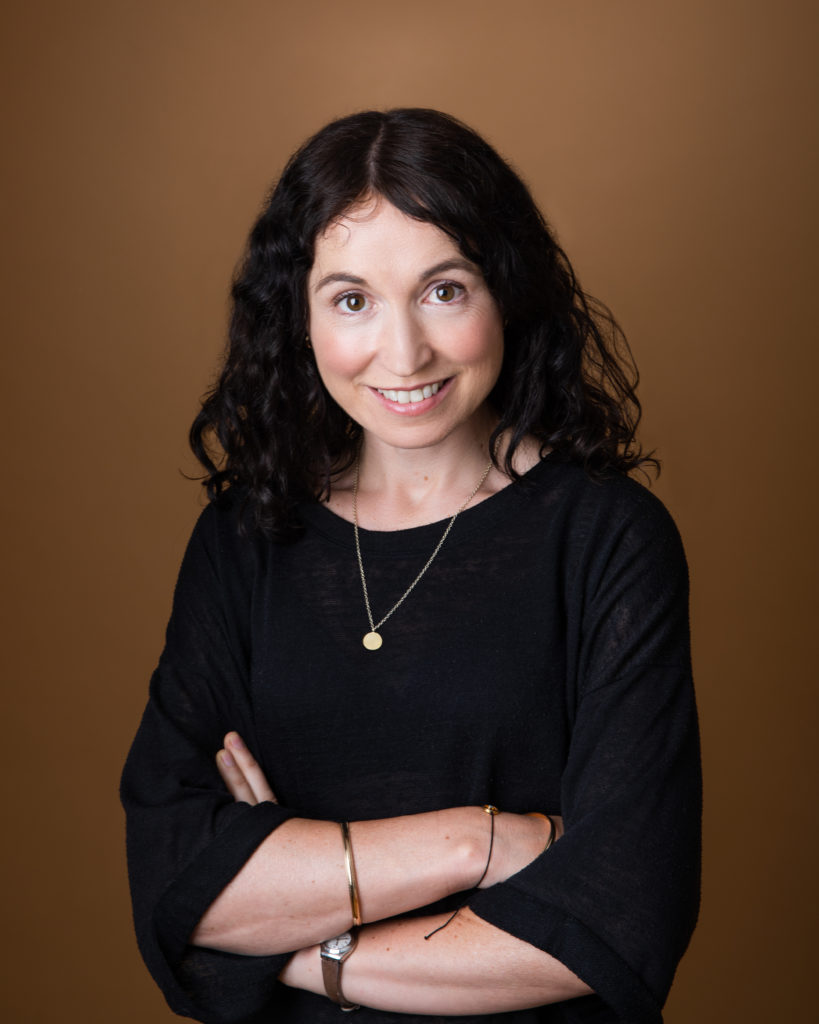
Mary McCarthy
Mary McCarthy is a freelance journalist writing for a number of publications. She is an avid reader and an iron-willed book club administrator. @maryknowsbees








